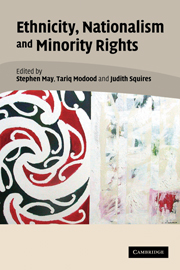Book contents
- Frontmatter
- Contents
- Preface
- List of contributors
- 1 Ethnicity, nationalism, and minority rights: charting the disciplinary debates
- Part I Ethnicity and ethnic groups
- 2 Ethnicities and multiculturalisms: politics of boundaries
- 3 Ethnicity without groups
- 4 Ethnicity, class, and the 1999 Mauritian riots
- 5 Black nationalism and African American ethnicity: the case of Afrocentrism as civil religion
- Part II The state and minority claims
- Part III New directions
- Index
- References
2 - Ethnicities and multiculturalisms: politics of boundaries
Published online by Cambridge University Press: 22 September 2009
- Frontmatter
- Contents
- Preface
- List of contributors
- 1 Ethnicity, nationalism, and minority rights: charting the disciplinary debates
- Part I Ethnicity and ethnic groups
- 2 Ethnicities and multiculturalisms: politics of boundaries
- 3 Ethnicity without groups
- 4 Ethnicity, class, and the 1999 Mauritian riots
- 5 Black nationalism and African American ethnicity: the case of Afrocentrism as civil religion
- Part II The state and minority claims
- Part III New directions
- Index
- References
Summary
How far have ethnic studies advanced past the finding that ethnicity is constructed, not primordial? While the “decolonization of ethnicity” is still under way, at times the stream of ethnic studies seems to add up to little more than a series of vignettes. Ethnicity is still talked about in a generalizing fashion, as if in each contribution the sociology of ethnicity has to be reinvented again and again. But what if we unpack ethnicity by means of a typology and taxonomy of ethnicities, and thus bring the sociology of ethnicity to the foreground and bring finesse and method into the discussion? This is the aim of the first chapter.
The second aim of this chapter is to twin the ethnicity discussion with the discussion on multiculturalism – combining and contrasting discourses of ethnicity and multiculturalism. Multiculturalism, like ethnicity, is a moving target – an ongoing cultural flux and an institutional arrangement, a target of criticism or a reform platform. Ethnicity is a contemporary vocabulary for various notions of group boundaries; multiculturalism, likewise, is a discourse that negotiates group boundaries. Thus both ethnicity and multiculturalism address the underlying theme of the politics and discourse of group boundaries. Group boundaries, a fundamental theme in anthropology and social science, now come back in various guises, such as the “spatial turn” that takes us beyond notions of borderlessness and nomadism, and reterritorialization, border matters, border theory, border consciousness, and so forth (cf. Nederveen Pieterse 2002).
- Type
- Chapter
- Information
- Ethnicity, Nationalism, and Minority Rights , pp. 27 - 49Publisher: Cambridge University PressPrint publication year: 2004
References
- 12
- Cited by



